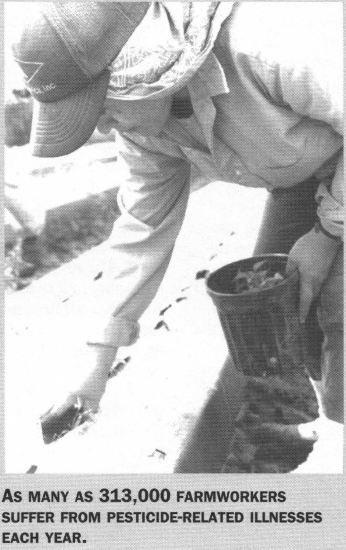Field of Pain

Dade City, Fla. — Maria Isabel Rosales watches her mother suffer from asthma after years of being exposed to pesticides in the vegetable fields of Florida. “The workers smell everything, and they swallow everything,” says Maria. “They don’t take lunch in order to pick more, so they eat the fruits and vegetables from the fields. By the time they know about the danger, they’re in the hospital. In a few years, they get really sick.”
In Florida, where agriculture is a multi-billion-dollar industry, those who work the fields are poor people of color. There is close to an even split between Latinos and blacks.
They also suffer from the highest rate of toxic-related injuries in the nation. Every day farmworkers are subjected to chemicals that cause birth defects, spontaneous abortions, skin rashes, swollen joints, nausea, numbness, tingling hands and feet, and nose bleeds. Yet farmworkers are excluded from a state right-to-know law that allows other workers to obtain written information on chemicals they have been exposed to.
Even when chemical companies pay for the harm they cause, farmworkers receive no compensation. Du Pont Company paid $400 million earlier this year to settle a lawsuit over its fungicide Benlate, but the money went to growers who claimed that Benlate damaged their crops (see “Death of a Nursery,” page 47).
Worker advocates are struggling to convince state lawmakers to shift the focus to worker protection. Groups like Farmworkers Self-Help in Dade City and the Farmworker Association of Central Florida have been holding press conferences and meetings with state officials, demanding that immediate attention be given to the health effects on workers exposed to pesticides.
“Racism and poverty are killing my people,” says Margarita Romo, director of Farmworkers Self-Help. “Anywhere there are farmworkers it’s the same — bad housing, lousy pay, terrible working conditions, poor education and medical care.”
Romo has lobbied on behalf of farmworker rights for close to 10 years, and she was in the halls of the legislature again this past session working to include farmworkers in the right-to-know law. Farmworkers went with her, holding signs saying, “They can still poison us, we just want to know what they are poisoning us with.” The bill was never brought to a vote, but advocates vow to continue their fight.
Farmworkers Self-Help represents primarily immigrants and Mexican-Americans, but serves all low-income people in the community. The group places families in housing, conducts English classes, provides paralegal assistance, serves as a reference for members trying to obtain loans, and helps create small businesses such as taco stands, a plant nursery, a catering service, and a thrift shop.
Farmworker Association of Central Florida is also helping its 4,000 Latino, African American, and Haitian members create their own economic development project. The group has formed worker-owned co-operatives, a credit union, a grocery store, a Mexican restaurant, and a self-help housing development.
Organizers realize that environmental justice takes more than fighting pesticides—it requires developing the economic capacity of communities and empowering workers to speak out for their rights. “We’ve got to come out of our barrio and take what is ours,” says Romo. “We have to decide as farmworkers—whether we’re Hispanic or black or white—that we will not take inhuman treatment any more.”
Karen Woods is a Tallahassee political consultant to Farmworkers Self-Help, Farmworker Association of Central Florida, and Florida Rural Legal Services.